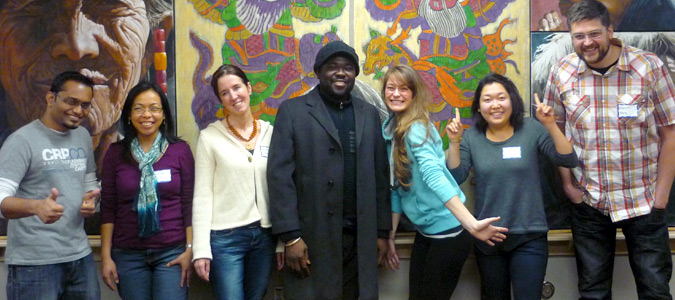Unique partnership creates UN internships for U of S students
University of Saskatchewan students are the first in the world to participate in a unique partnership between the United Nations Development Program (UNDP) and Universities of Canada (UCAN).
By Colleen MacPherson The U of S was chosen to pilot the UCAN-UNDP initiative that aims to give Canadian graduate and law students  international experience in poverty reduction through legal empowerment of marginalized groups. Spearheading the UCAN-UNDP initiative is U of S alumnus Gerald Seniuk, former chief judge of the Saskatchewan provincial court and a judicial consultant for the Government of Canada.
The U of S was chosen to pilot the UCAN-UNDP initiative that aims to give Canadian graduate and law students  international experience in poverty reduction through legal empowerment of marginalized groups. Spearheading the UCAN-UNDP initiative is U of S alumnus Gerald Seniuk, former chief judge of the Saskatchewan provincial court and a judicial consultant for the Government of Canada.In May, six U of S graduate students and one law student will be sent to various UNDP offices around the world to pursue internships. During their four-month internships, the students will take on various fieldwork assignments that will contribute to the UCAN-UNDP initiative. Most of the work will involve identifying assets in communities and cultivating them to permit economic gain for the people. The students are reporting back to the U of S College of Graduate Studies and Research; read about their experience on the college website.
"Along with other international projects, my experiences as a judicial consultant exposed me to the world of international aid and development and got me thinking about the encountered gains and frustrations," says Seniuk, who was inspired by the final report issued by the Commission on Legal Empowerment of the Poor (LEP) in 2008.
The report discredited the current mechanisms for helping the underprivileged, and instead, provided an alternative strategy that was based on the underprivileged recognizing their assets and using their own skills and knowledge to promote wealth.
"The LEP report recognized the important role of law in creating a meaningful and productive life for societies," says Seniuk. "It was filled with wisdom and insight into the practical application of law as a tool for development and liberation. It was a blueprint, albeit one that had to be filled in locally by those it was meant to serve."
Encouraged by the report, the UNDP has supported global efforts that allow the poor access to the legal system that ultimately breaks the cycle of exclusion and poverty. In support of these endeavours, Seniuk and others put some of the LEP recommendations into action. In collaboration with the College of Graduate Studies and Research at the U of S, they developed the UCAN-UNDP internship program.

